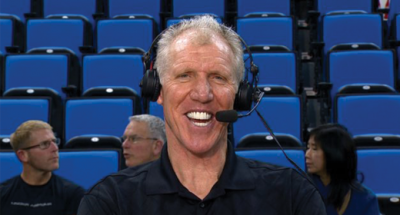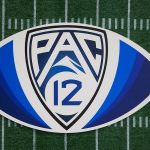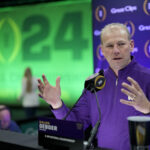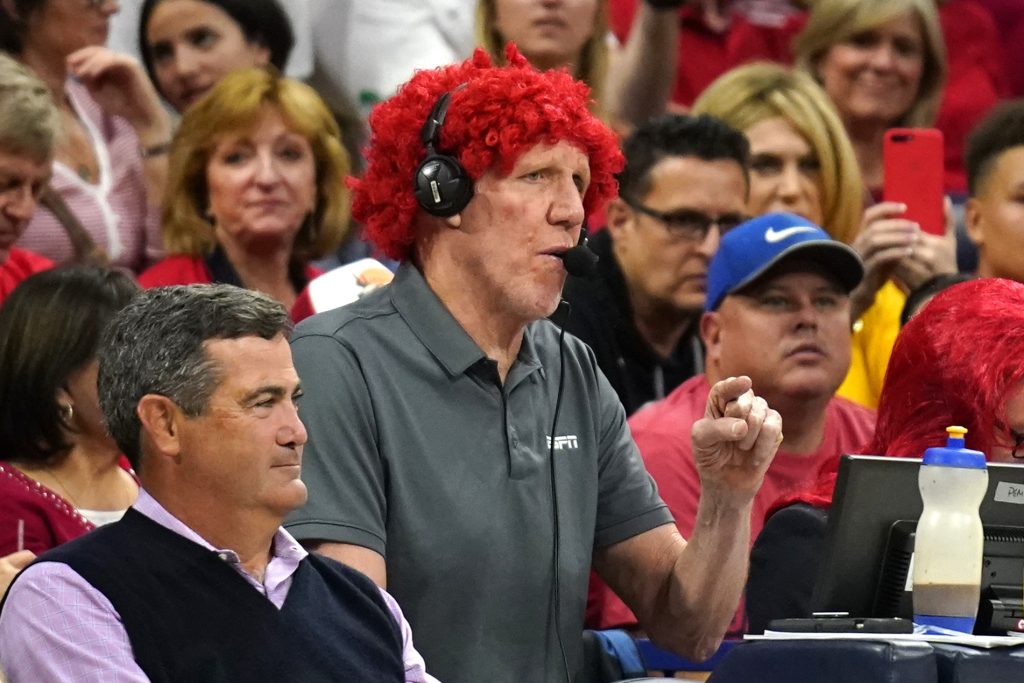LAS VEGAS — The Pac-12 tournament should provide an impressive amount of entertainment this week at T-Mobile Arena.
The on-court action might even be intriguing.
With Bill Walton on the call for several Pac-12 Networks broadcasts, mirth and mayhem — or is it nonsense and lunacy? — are sure to rule the airwaves.
One of the greatest players in college basketball history is one of the sport’s most polarizing broadcasters. There’s no middle ground when it comes to the champion of the “Conference of Champions.”
But what’s it like to work alongside Walton during a broadcast? How does he prepare for games? Does he even prepare?
Also, do you have to know every Grateful Dead song by heart to receive the assignment, or only half of them?
We asked the three play-by-play announcers who know Walton best: Dave Pasch, who serves as Walton’s foil — err, sidekick on ESPN broadcasts; Ted Robinson, who works with Walton on the Pac-12 Networks; and Roxy Bernstein, who pairs with Walton on both networks.
While reading the following first-person accounts, please note: The interviews were conducted separately (last week) but have been pieced together to create the feel of a round-table discussion and allow the topics to flow from one to another.
Robinson: “The first thing I’d say is that working with Bill is completely different from any other basketball game I’ve ever called. It’s so different that I find it fun. If it’s not the most compelling game, and Bill understands this better than anyone — remember, he did Clippers games for years — then it’s entertainment. We aren’t comedians. He doesn’t tell jokes. But he entertains. He has fun.”
Bernstein: “The first time I worked with Bill was an NIT game between USF and LSU in 2014. I had watched Bill, and I called Dave Pasch and Tim Sullivan, who was Bill’s main producer at ESPN, and asked them, ‘What do I need to know?’ And they prepared me for the hurricane that is Bill Walton.”
Pasch: “The first time I did a game with Bill was the NBA Finals in 2006. He claims it never happened.”
Bernstein: “He was so excited to do the game at USF because of his affinity for Bill Russell. When we met up, he was as disarming as anyone could be.”

Pasch: “When ESPN got the Pac-12 package a decade ago, our first game was Arizona-Oregon. Afterward, my phone was blowing up with people saying how engaging they found it.”
Bernstein: “It took a while to get used to the differences from working with other announcers. Early on, I was so on edge thinking I had to keep up with Bill and manage the game as well.”
Pasch: “The thing that’s hilarious and heartwarming is that when Bill does a game, it’s like he’s getting ready for Game 7 of the NBA Finals. He starts 90 minutes before tipoff and has a stretching routine. He’s inhaling energy chews and protein shakes and bars. It feels like he’s ready to play a game and even though I’m his teammate on the broadcast, in some ways I’m like Kareem (Abdul-Jabbar)— I’m Bill’s adversary. That gives you a glimpse into how important it is to him.”
Robinson: “I worked a game with (Pac-12 Networks analyst) Eddie House. I had conversations with both coaches before the game, asked them who’s healthy and all that stuff and came up with storylines to drive to Eddie during the broadcast. But Bill is so focused on preparation that he goes to the shootaround” — a light workout several hours before tipoff — “and talks to people all around the program about the players. He does the work I usually do. So when I work with Bill, I don’t deal with the players’ backgrounds. I focus on the metrics.”
Bernstein: “I prepare for a game regardless of who the analyst is, whether it’s Sean Farnham or Corey Williams or Don MacLean. We have production meetings and discuss the themes and ideas. But it’s completely different with Bill. He keeps us totally in the dark about what he’s going to do during the broadcast. He wants our reaction to be like the viewer’s. There’s nothing contrived, nothing staged. It’s all organic.”
Pasch: “One thing that’s unfair to Bill is that a lot of people think he doesn’t prepare and just talks about whatever he wants. He actually has pages and pages of notes. He goes to the shootaround, and even if it’s a team we’ve done many times, he still talks to the coaches and the sports information directors.”
Robinson: “There’s only one analyst I’ve ever worked with who did it like this, and I’ve worked with guys like Clark Kellogg and Bill Raftery. And that was Al McGuire. I did one game with Al. It was Ohio State against Michigan with the Fab Five. And we went to the Michigan shootaround and Al was in the stands with the manager and the equipment guy and he’d say, ‘Tell me about the kids.’ Bill’s in that pattern. He goes to the people around the team to get to know the players.”
Bernstein: “Before the season even starts, he talks to each team’s sports information director for 90 minutes to get the backstory on the players and coaches and even the trainers. If people only knew how hard he worked.”
Pasch: “He won’t talk to me before a game. He saves it all for the air, like when you don’t see the bride before the wedding.”
Bernstein: “At the shootaround, he sits at the opposite end of the court. I’ll ask him about Lori, his wife. And he’ll say, ‘Save it for the air, Roxy.’’’
Robinson: “I love it. It’s like working with John McEnroe.”
Pasch: “I don’t take nearly as many notes before a game I’m working with Bill because most of them won’t get into the broadcast. But I have to focus. Bill could be talking about something, and I need to know that a guy is two of his last 15 from 3-point range.”
Bernstein: “He definitely has a plan going into the games about the points he wants to get across. Some games, we have to keep him in focus. There was a UCLA-Oregon game in 2017 when Lonzo Ball was with the Bruins and Oregon had that really good team, and I’m like, ‘Hey Bill, it’s a four-point game.’ And then his insight about basketball was off the charts. He laid everything out. He could be a nuts-and-bolts analyst, but he doesn’t want that.”
Robinson: “Bill was once in a very dark place in his life with health problems. He found a doctor who took the pain away. He’ll work as long as he can. He’s able to maneuver, he can fly, and he can drive. He’s had 38 surgeries or something like that.”
Bernstein: “With everything he has been through with the injuries and the surgeries, he feels there’s an opportunity to teach younger audiences about basketball. But he doesn’t take himself too seriously. He says, ‘Ask me anything. I’m an open book.’’’
Robinson: “I told him that I made my college decision, on Jan. 19, 1974, the day UCLA’s 88-game winning streak ended, because of the atmosphere at Notre Dame. I decided that was where I wanted to go. Bill still says that’s the worst day of his life.”
Pasch: “He jokes around about me growing up on an ostrich farm in Arizona. A few years ago, Arizona had a player named Stone Gettings. Bill brought me a gift. It was a huge stone, and then he asked me if I’ve ever been stoned.”
Robinson: “The thing that is so different about Bill is that over the last 10 years, he has gotten to know me. And he asks me questions about my wife, my kids, my grandkids. Think about how few people of Bill’s stature actually ask questions about you. But he’s different.”
Bernstein: “One thing is, they don’t come any smarter than Bill. He’s genius level.”
Robinson: “He’s incredibly generous and wicked smart. Before I went to broadcast the Australian Open, he gave me this tome on the history of Australia and how it was founded. He had read it.”
Bernstein: “We were doing a Utah-BYU game one time and I couldn’t have dinner with him because of a scheduling issue. So I hooked him up with (BYU athletic director) Tom Holmoe. Afterward, Tom called me and said, ‘Now I understand the method to his madness.’ Apparently, Bill peppered him with questions about Provo, about BYU, about the school library. He has a voracious appetite for learning.”
Pasch: “He prepares for the broadcast like it’s an infomercial for the school, or the city. He has all these notes, but he doesn’t know how it will play out.”
Robinson: “He doesn’t get caught up in preparing for the tactical part of the game. After the first four minutes, he’ll say, ‘They have to keep this guy from doing that.’ Maybe it’s the John Wooden influence, because he doesn’t overthink it.”
Pasch: “My preparation is very much the same as with any announcer, but then you get on air with him and it’s a free-for-all. Maybe that’s like how he used to play. You prepare and get ready, but once it starts, you don’t know the direction the game will go. Lionel Hollins (a former teammate of Walton’s in the NBA) once told me that broadcasting is like Bill’s back in the locker room. I’m either an adversary or a teammate. The broadcast to him is like he’s still playing. And he works himself into an altered state to get ready.”
Bernstein: “He’s done the cookie-cutter broadcast on the NBA, and he could still do that. But he’s a fan. He’s celebrating life. And that’s true of any broadcast. He throws everything he’s got at every broadcast. Whatever game he’s doing, he views it as, ‘This is the place to be tonight.’”
Robinson: “After every game, people wait to pose and shake his hand. Bill asks them to wait so he can pack up. Then he talks and poses with everyone.”
Bernstein: “I’ve seen him give out his email. I’ve seen him give out his phone number. And I guarantee he gets back to every person.”
Robinson: “We were at Arizona, and here’s a UCLA guy, and the Arizona fans flocked to him. And you know what: Three-quarters of the people who do that are 30 years and under — the young people who didn’t see him play but know him as a TV personality, because he just grabs you.”
Support the Hotline: Receive three months of unlimited access for just 99 cents. Yep, that’s 99 cents for 90 days, with the option to cancel anytime. Details are here, and thanks for your support.
*** Send suggestions, comments and tips (confidentiality guaranteed) to pac12hotline@bayareanewsgroup.com or call 408-920-5716
*** Follow me on Twitter: @WilnerHotline
*** Pac-12 Hotline is not endorsed or sponsored by the Pac-12 Conference, and the views expressed herein do not necessarily reflect the views of the Conference.
Related posts:
 Wilner Hotline – From the red meat to the cupcakes and everything in between, we rank the 2022 Pac-12 schedules
Wilner Hotline – From the red meat to the cupcakes and everything in between, we rank the 2022 Pac-12 schedules

(Michael Malone/Bay Area News Group)
Hotline mailbag: Best guess on survival scenarios, Pac-12 vs. Big 12 valuation, expansion options, Newsom’s involvement and more
Southern California guard JuJu Watkins,(AP Photo/Mark J. Terrill)
Pac-12 WBB Preview – UCLA vs USC at the top, tough competition and rivalries
Washington head coach Kalen DeBoer (AP Photo/David J. Phillip)
Wilner Mailbag: Washington as “flash in the pan,” ACC risks for Stanford and Cal, next moves for the ‘Pac-2’ and moreJon Wilner
Jon Wilner has been covering college sports for decades and is an AP top-25 football and basketball voter as well as a Heisman Trophy voter. He was named Beat Writer of the Year in 2013 by the Football Writers Association of America for his coverage of the Pac-12, won first place for feature writing in 2016 in the Associated Press Sports Editors writing contest and is a five-time APSE honoree.
